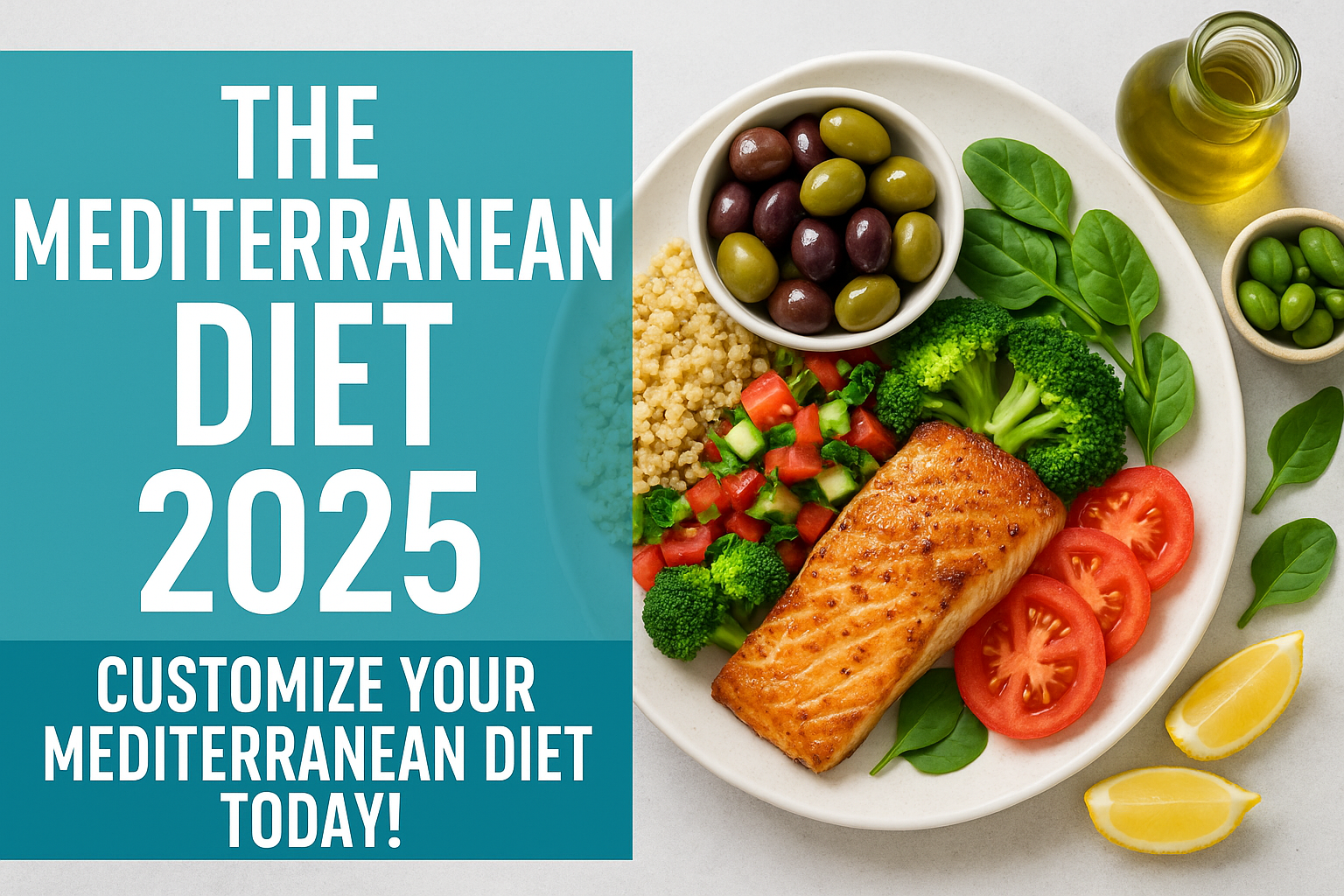The Mediterranean Diet is a way of eating based on the traditional cuisines of countries like Greece, Italy, Spain, and southern France. It emphasizes whole, minimally processed foods, with a focus on plant-based ingredients, healthy fats, and moderate protein consumption. Unlike restrictive fad diets, the Mediterranean Diet is flexible, sustainable, and promotes a balanced lifestyle that includes physical activity and social dining.
Core Principles of the Mediterranean Diet:
Plant-based focus: Fruits, vegetables, whole grains, legumes, nuts, and seeds form the foundation of the diet.
Healthy fats: Olive oil is the primary fat source, replacing butter and other saturated fats.
Moderate protein: Fish, poultry, and eggs are consumed in moderation, while red meat is limited.
Low dairy: Cheese and yogurt are included in small amounts, often as part of meals.
Minimal processed foods: The diet prioritizes fresh, whole foods over processed or packaged items.
Wine in moderation: Red wine is consumed in small amounts, typically with meals (optional).
Lifestyle factors: Regular physical activity, social meals, and mindful eating are integral to the Mediterranean lifestyle.
How to Start the Mediterranean Diet:
Transitioning to the Mediterranean Diet is simple and doesn’t require drastic changes. Here are some practical tips:
Start with small changes: Replace butter with olive oil or swap white bread for whole-grain bread.
Plan your meals: Create a weekly menu to ensure variety and balance.
Shop smart: Stock up on fresh produce, whole grains, and healthy fats.
Cook at home: Preparing meals allows you to control ingredients and portions.
Eat socially: Share meals with family or friends to enhance the experience.
Stay active: Incorporate daily physical activity, such as walking, yoga, or swimming.
Health Benefits of the Mediterranean Diet:
The Mediterranean Diet is backed by decades of scientific research, showing a wide range of health benefits. Here are some of the most well-documented advantages:
1. Heart Health
The Mediterranean Diet is renowned for its positive impact on cardiovascular health. Studies, such as the PREDIMED trial, have shown that it can reduce the risk of heart disease by up to 30%. The diet’s emphasis on healthy fats (like olive oil and omega-3s from fish), fiber-rich foods, and antioxidants helps lower cholesterol levels, reduce blood pressure, and prevent heart attacks and strokes.
2. Weight Management
Unlike restrictive diets, the Mediterranean Diet promotes sustainable weight loss or maintenance. Its focus on nutrient-dense, fiber-rich foods helps you feel full longer, reducing the likelihood of overeating. The diet’s flexibility also makes it easier to stick to long-term.
3. Improved Brain Health
The diet’s anti-inflammatory foods, such as fatty fish, nuts, and olive oil, support cognitive function and may reduce the risk of Alzheimer’s disease and dementia. Research suggests that adherence to the Mediterranean Diet is linked to better memory and slower cognitive decline in older adults.
4. Reduced Risk of Type 2 Diabetes
The Mediterranean Diet’s low-glycemic foods, such as whole grains and legumes, help regulate blood sugar levels. Studies have shown that it can improve insulin sensitivity and reduce the risk of developing type 2 diabetes.
5. Cancer Prevention
The diet’s high intake of antioxidants from fruits, vegetables, and olive oil may help protect against certain cancers, including breast and colorectal cancer. The anti-inflammatory properties of the diet also contribute to overall cancer risk reduction.
6. Longevity and Overall Wellness
The Mediterranean Diet is associated with a longer lifespan and better quality of life. Its balanced approach, combined with an active lifestyle and social eating, promotes mental and physical well-being.
Foods to Eat on the Mediterranean Diet:
The Mediterranean Diet is flexible, but it emphasizes specific food groups. Here’s a breakdown of what to include:
1. Vegetables
Leafy greens (spinach, kale, arugula)
Tomatoes, zucchini, eggplant, bell peppers
Onions, garlic, broccoli, cauliflower
Aim for a variety of colors to maximize nutrient intake.
2. Fruits
Berries (blueberries, strawberries)
Apples, oranges, figs, grapes
Pomegranates, peaches, apricots
Fresh fruits are preferred over dried or juiced versions.
3. Whole Grains
Quinoa, brown rice, barley, farro
Whole-grain bread and pasta
Oats and bulgur
4. Legumes
Lentils, chickpeas, black beans
Kidney beans, fava beans
Excellent plant-based protein and fiber sources.
5. Nuts and Seeds
Almonds, walnuts, pistachios
Chia seeds, flaxseeds, sesame seeds
Consume in moderation due to high calorie content.
6. Healthy Fats
Extra virgin olive oil (primary fat source)
Avocados
Olives
7. Fish and Seafood
Salmon, mackerel, sardines (rich in omega-3s)
Tuna, shrimp, mussels
Aim for at least two servings per week.
8. Poultry and Eggs
Chicken, turkey
Eggs (in moderation)
9. Dairy
Greek yogurt, feta cheese, Parmesan
Consume in small amounts, often as a garnish or side.
10. Herbs and Spices
Basil, oregano, rosemary, thyme
Garlic, turmeric, cinnamon
Use to flavor dishes instead of salt.
11. Red Wine (Optional)
Moderate consumption (1 glass per day for women, 1-2 for men)
Always consult a doctor if alcohol is a concern.
Foods to Avoid on the Mediterranean Diet:
To maximize the benefits of the Mediterranean Diet, limit or avoid the following:
Processed meats: Sausages, bacon, hot dogs
Refined grains: White bread, white rice, sugary cereals
Sugary drinks: Soda, energy drinks, sweetened juices
Processed foods: Chips, fast food, packaged snacks
Excessive red meat: Beef, pork, lamb (limit to once or twice a month)
Butter and margarine: Replace with olive oil
Added sugars: Candy, desserts, sugary pastries
Sample Mediterranean Diet Meal Plan:
Here’s a sample one-day meal plan to help you get started:
Breakfast
Greek yogurt with fresh berries, walnuts, and a drizzle of honey
Whole-grain toast with avocado
Herbal tea or black coffee
Lunch
Grilled salmon with a quinoa and roasted vegetable salad (zucchini, bell peppers, cherry tomatoes)
Dressed with extra virgin olive oil and lemon juice
A glass of water or sparkling water
Snack
A handful of almonds
Sliced cucumber with hummus
Dinner
Baked chicken with rosemary and garlic
Lentil and vegetable stew (carrots, onions, spinach)
A small glass of red wine (optional)
Fresh fruit salad for dessert
Evening Snack (Optional)
A small piece of dark chocolate (70% cocoa or higher)
Herbal tea
Common Myths About the Mediterranean Diet:
Myth: It’s all about pasta and pizza.
Truth: The diet emphasizes whole grains, vegetables, and healthy fats, not processed Italian foods.
Myth: You can’t eat meat.
Truth: Red meat is limited, but poultry, fish, and eggs are included in moderation.
Myth: It’s too complicated to follow.
Truth: The diet is simple and adaptable, focusing on whole foods and basic cooking techniques.
Scientific Backing for the Mediterranean Diet:
The Mediterranean Diet is one of the most studied dietary patterns. Key studies include:
The Seven Countries Study (1960s): Linked Mediterranean eating patterns to lower rates of heart disease.
PREDIMED Study (2013): Demonstrated significant reductions in cardiovascular events among those following the diet.
Neurological Studies: Showed improved cognitive function and reduced risk of Alzheimer’s in adherents.
Conclusion:
The Mediterranean Diet is a scientifically backed, sustainable, and enjoyable way to improve your health. By focusing on whole foods, healthy fats, and an active lifestyle, it offers benefits for your heart, brain, and overall well-being. Whether you’re looking to lose weight, prevent chronic diseases, or simply enjoy delicious meals, the Mediterranean Diet is a flexible and rewarding choice. Start small, savor the flavors, and embrace the Mediterranean lifestyle for a healthier, happier you.
MEDITERRANEAN DIET SUCCESS STORIES
Frequently Asked Questions About the Mediterranean Diet:
1. Is the Mediterranean Diet expensive?
The Mediterranean Diet can be budget-friendly. Staples like legumes, whole grains, and seasonal vegetables are often affordable. Buying in bulk and choosing frozen fish or produce can further reduce costs.
2. Can I lose weight on the Mediterranean Diet?
Yes, the Mediterranean Diet can support weight loss due to its focus on nutrient-dense, low-calorie foods. However, portion control and regular exercise are key to achieving weight loss goals.
3. Is the Mediterranean Diet suitable for vegetarians or vegans?
The diet is highly adaptable. Vegetarians can focus on plant-based proteins like legumes and nuts, while vegans can omit dairy and fish, relying on plant-based alternatives.
4. Can I drink alcohol on the Mediterranean Diet?
Moderate red wine consumption is allowed, but it’s optional. If you don’t drink alcohol, you can skip it entirely without missing out on the diet’s benefits.
5. How does the Mediterranean Diet compare to other diets?
Unlike restrictive diets (e.g., keto or paleo), the Mediterranean Diet is flexible, sustainable, and backed by extensive research. It prioritizes balance and long-term health over quick fixes.
6. Are there any risks to the Mediterranean Diet?
The diet is generally safe for most people. However, those with specific health conditions (e.g., nut allergies or kidney issues) should consult a healthcare provider before making dietary changes.






1 thought on “The Mediterranean Diet 2025: Customize Your Mediterranean Diet Today!”
Comments are closed.